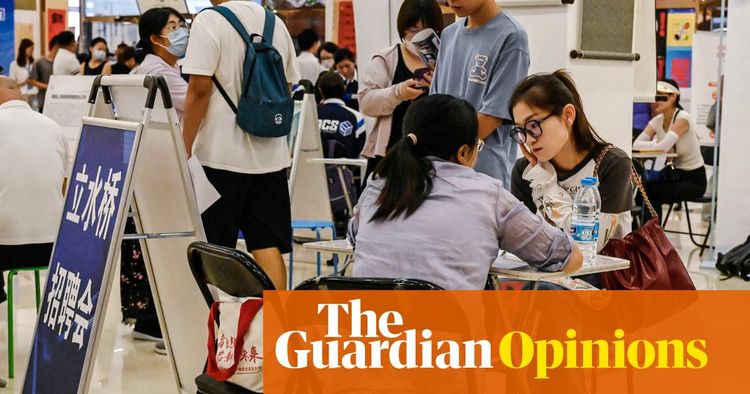The Guardian view on the Chinese economy: it looks bad. What we can’t see may be worse | Editorial

Several recent reports indicate that the Chinese economy is not doing well. It was expected to recover after abandoning its strict "zero Covid" measures, but unfortunately, things have not gone according to plan. Just a few weeks ago, the country experienced deflation, which is not a good sign. Important measurements such as industrial production, investment, and retail sales have all fallen below what was anticipated.
The most worrying number is the one that is not visible. The rate of unemployment among young people was excluded from the monthly report on the economy after hitting a record high of 21.3% in June. This implies that not only was July even worse, but it also suggests that improvement is unlikely to happen soon. The government has chosen not to publish certain statistics in recent years. Although there are various reasons for this decision, and some data might still be available to private research firms, it has likely contributed to hiding unfavorable news and has made it more challenging to cross-check information. Chinese economists are also feeling pressure to refrain from discussing negative indicators.
During the Communist party's rule, politics has always been prioritized over the economy. However, the level of subordination hasn't been as prominent for a long time. Tech giants have been controlled and bankers have been instructed to analyze Xi Jinping's ideology. The crucial query is whether this political tightening is not only impacting economic progress but also our understanding of it.
The main focus is on the people within the country, especially because the government is hesitant about implementing a stimulus and relies on them to spend money. It is worth noting that the National Bureau of Statistics (NBS) ceased publishing an index that measured consumer confidence in April. However, there is also an increasing animosity towards foreign nations. In June, Beijing significantly broadened the interpretation of espionage in their already extensive and unclear national security laws. In addition, a significant Chinese data provider has started restricting access for users from other countries.
However, the leadership has its own areas of ignorance. Li Keqiang, the former premier who served until recently, once confided to an American diplomat that the GDP statistics were artificially created and therefore not to be trusted. Experts prefer to scrutinize data gathered at the lowest levels of government bureaucracy, recognizing that officials at every stage manipulate the numbers to gain favor from their superiors.
Observers note that the National Bureau of Statistics (NBS) has made significant efforts to address these concerns, suggesting that at least some data may be more reliable now. However, in a system that puts great emphasis on promoting only positive vibes, individuals are apprehensive about sharing negative news. This goes beyond restricting investigative journalism; even confidential briefings provided to high-ranking officials, separate from journalists' public work, are increasingly subjected to self-censorship or modification by intermediaries. Certain analysts speculate that individuals within the national security system also exercise caution when transmitting information.
"It is a mechanism designed to limit information for both the general public and those in power," proposes Prof Dali Yang, a political scientist. In his book Wuhan, he highlights how China diligently established an early-warning system for diseases after Sars. However, due to bureaucratic disarray and intentional suppression of negative updates, reports about the Covid-19 outbreak were withheld from reaching Beijing during the crucial initial phase. It is undeniable that central planners closely monitor the economy, undoubtedly having a superior understanding compared to the rest of us. The crucial aspect to consider is whether their information is reliable and promptly delivered.









































